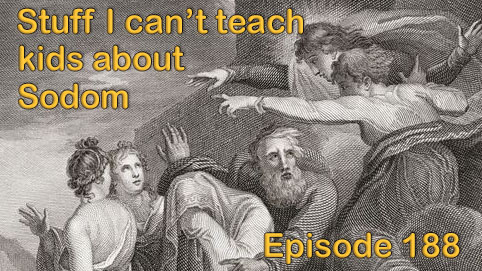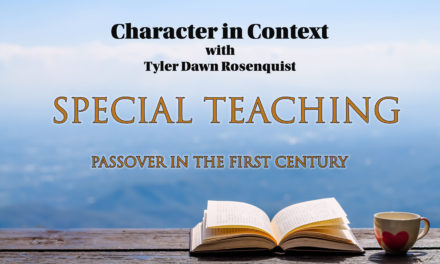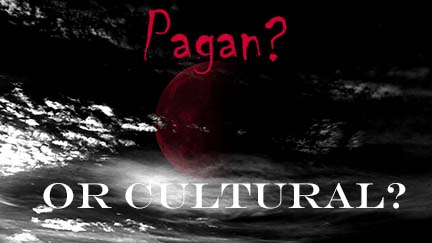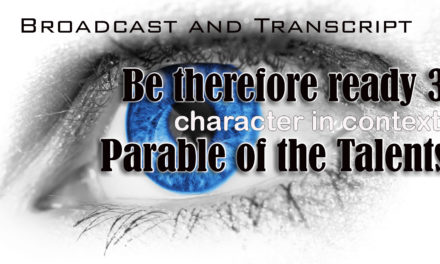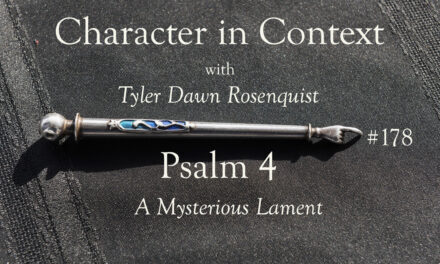Ugh. When I started my Context for Kids radio show, I was just dreading this series. Genesis 19—really the only chapter in the Bible I would want to teach even less is Judges 19. But, I can’t skip it over, right? I will be teaching the kids Genesis 19 interpretation by using the prophets and how they viewed and spoke about Sodom—as an unhospitable and oppressively wicked society—and leave sex out of it. But you guys need to be able to answer the hard questions that would get me fitted for an ankle bracelet if I tried it. This is a brutal, deep dive into the ancient Near Eastern context of the account of the destruction of the cities of the plain and so you’ll likely be hearing things you’ve never heard before such as the ancient practice of shaming via gang rape, and the dyadic community mindset that drove Lot’s daughters to incest. Not for the faint of heart. Not for little kids.
Or you can watch the longer version on YouTube.
If you can’t see the Podcast player, click here.
If you have kids in the room, better to listen to this later unless they are quite mature. I can’t even begin to tell you how long I have been dreading teaching this chapter of the Bible, Genesis 19, to the kids on my radio show—but I am sure you can imagine. Ugh. Sodom and Gomorrah. Not only do we have the attack that is probably sexual in nature against God’s messengers, but also the offering up of Lot’s daughters to the crowd, and the subsequent rape of Lot by his daughters. This is a nightmare chapter—despite being tame by the standards of the even more disturbing Judges 19 which goes unnoticed because Genesis 19 has been used by special interest groups throughout a lot of church history to attack certain pet sins while ignoring others. But what is going on here? What is the double meaning of “all” the men of Sodom wanting to “know” the outsiders? Why on earth did Lot offer up his daughters and why are we so inclined to excuse it and ignore the world as it was in those days by softening up his motivations? And what on God’s good earth were the daughters of Lot thinking when they raped their father? Obviously, this is going to be a disturbing episode and there is no way around it. And how can I teach kids the one chapter in the Bible which is best summarized by “let’s gang rape these outsiders,” followed by “no, rape my virgin daughters instead,” then “No, we’re going to rape you and even worse instead because you are acting so judgy,” through the destruction of the cities on the plain and ending with, “Let’s rape our father, otherwise we’ll never be moms.” Well, I have to be very strategic and actually teach it more as it was interpreted by the prophets than as it was presented later in the NT epistles when Greco-Roman and not ancient Near Eastern sexual culture was being countered.
Hi, I am Tyler Dawn Rosenquist, and welcome to Character in Context, where I teach the historical and ancient sociological context of Scripture with an eye to developing the character of the Messiah. This used to be a standalone ministry but now I am using it to supplement my Context for Kids ministry work—equipping grownups to answer the hard questions kids ask about things I can’t teach them without ending up wearing an ankle bracelet. Lots for adults to learn still but geared more toward discipleship of our youth and less toward context studies—but still very much contextual. I still have a ton of teachings for grownups at theancientbridge.com and on my YouTube channel, and I think that most of the listeners to Context for Kids are probably grownups anyway so you can catch me there as well if you enjoy crawling through Genesis at a snail’s pace. I also have curriculum books and all that jazz available on Amazon. All Scripture this week is from the CSB, the Christian Standard Bible, unless I say otherwise.
So, we start out with Lot at the city gate—simple enough. The city gate was where business was conducted, contracts made and witnessed, and legal disputes heard and judged. It wasn’t like the sort of castle gate we think of from movies. City gates were big administrative centers where elders would hang out and people too rich to have to work for a living. Lot is evidently such a man—and he was wealthy at some point before he was kidnapped by the four kings in Gen 14 but we don’t know what happened after that. At that time, he was outside the city with his flocks and herds but now we find out that he is living inside the city and not in tents anymore. He is no longer a sojourner in the area he chose for himself, he’s settled down and is putting down roots. As we will discover later, he is even marrying his virgin daughters to some of the men of the city. We knew from Gen 13 that Sodom was a wicked place over two decades previous, and from Gen 14 that the King of Sodom was so revulsive that Abram didn’t want anything that belonged to him. But what is the city like now?
Well, bad enough that when Lot sees the travelers, he rushes out to intercept them, even bowing to the ground in a probable attempt to put them completely at ease by honoring them in a situation where they would usually be expected to honor Lot. Hopefully you listened to my two-part series on ancient hospitality because I will only be glossing over that material here. Lot offers hospitality to the two seeming men for the night and, as per the custom of the time, they refuse the first offer but then Lot insists and they agree. This honors both the host and the guests—they get to act like they don’t need help and the host is honored for generosity. Win/win situation. And Lot hurries them into his home, likely because he knew exactly what would happen if he delayed. The men of Sodom are evidently employing a very ancient Near Eastern shaming technique against visitors—one that shockingly gives them honor while stripping honor from their victims. If you remember, once under another man’s roof, the safety and protection of the visitors is sacred—however, Lot isn’t a native of Sodom or even the region and so he lacked the authority to bring strangers into the city and under their protection. As host, Lot can’t ask them any questions about their identity or mission and they also cannot ask Lot for anything he doesn’t provide. Lot has violated the hospitality conventions of the ancient world—the city wasn’t his to provide sanctuary and the men tell him this in no uncertain terms later.
The text tells us that all the men of the city come to Lot’s home and demand to have the guests presented to them so they might “know” them and this is more nuanced than it first appears. Hosts cannot ask anything about visitors, and Lot has circumvented their right to know who these people are and what they are doing in a time where travelers can very well be advanced spies for enemy armies. And so, we have this variant of “yada,” which is translated as know and sometimes means sexual knowledge but usually means gaining actual information and is often a covenant term as when Yahweh states that He knows Abraham. I believe in this case we don’t have to choose one or the other because I think they are going to employ gang rape as a way to torture them for information and shame them. And that seems strange, right? Because we live in a society where we believe the rapist is shameful—although even a few decades ago the shame was all on the woman and was rarely prosecuted unless she could prove she didn’t have it coming and especially not if her husband was the attacker—which wasn’t illegal in all fifty states until the 1990’s and not even in one state until the 1970’s. But now things are very different—our culture despises rapists and knows that no one deserves this. Torah is very clear on stating that a rape victim is like a murder victim, completely innocent.
And the reason such laws were desperately needed to protect all women as well as men can be found in ancient works like The Contendings of Horus and Set, written within two hundred years, give or take before or after Abraham. So, this reflects the ancient Near Eastern perspective of the time. To make a long and graphic story very short and far less graphic, Set and his nephew Horus were battling over who would be king after the death of Set’s brother and Horus’s father Osiris—who was also the brother of Horus’s mother. Pharaohs, you know, terribly inbred and even later when the Greeks took over Egypt and realized that endogamous incestuous marriage consolidates power. Did you know Cleopatra was a Greek? It was a very popular Greek name, actually. Because their kings were inbred, so were their gods. It made sense at the time, before they knew enough about genetics to cut it out. Which also explains why it wouldn’t have been a big deal for Abraham to marry his own half-sister.
Anyway, the two are duking it out for the throne and you have to understand that Set is the traditional enemy of both Horus and Isis. So whenever people say that the IHS stands for Isis, Horus and Set as some sort of trinity you know one thing right away. They ain’t never read the mythology. And these fights between them are so brutal and underhanded that at one point, Set tries to destroy Horus by sexually penetrating him in his sleep. But Horus was totally onto him and tricked him into penetrating his hands instead. He took the resulting bodily discharge and through a trick, got Set to eat it on a salad and when Set later tried to disgrace Horus by proving he had raped him by calling up his discharge it came out of Set’s mouth instead, making him a laughingstock. But the key to this story and why it is so important to this teaching is that while Set’s attack was sexual in nature, it wasn’t about attraction or simple gratification but about shaming an opponent. When Set told the other gods, including Isis, what he thought he had done, Horus became the recipient of all the disgust and ridicule of them all. What the heck? Horus gets raped and the rapist gets honor points and the victim loses them? That’s messed up—but that was the ancient Near Eastern world of honor and shame. And no, that didn’t make it into my Honor and Shame in the Bible curriculum book! So, this is backward to us but this is the way ancient men used gang rape on male visitors. It wasn’t about homosexuality but about power, honor, and shame.
At this point, someone often says, “Oh so now you are excusing homosexuality.” And I reply, no, I just refuse to take the Bible out of context to try and prooftext a prohibition that can be found elsewhere. If Lev 18:22 and Romans 1 and other passages aren’t good enough for you because they aren’t as emotionally satisfying as believing that God would destroy a city of homosexuals then there are problems and it isn’t with my exegesis. In fact, Lev 18:22 does something revolutionary in the ancient world—it criminalizes/shames both penetrator and penetrated. Therefore, it is no longer a culturally accepted shaming technique. The man who perpetrates this will die. That’s huge. Most people don’t even see the other side of the legislation because they are focused on homosexuality, but it was way bigger than that. However, that law is many centuries away from being given. The men of Sodom are not only shaming the men but also their entire families, clans and nations. Again, I believe this text is about interrogation via gang rape, which is horrifying in the extreme.
Lot offers up his virgin daughters, which is also horrifying. This is our second mention of rape, but that’s not what bothers us the most. A father is willing to offer up his own young daughters to be gang raped so that he can preserve his own honor by not violating hospitality codes. Notice he doesn’t offer up himself or his wife because that would bring shame on him—daughters are expendable while wives are extensions of their husbands. In fact, in terms of expendability, going from least expendable to most expendable, were the patriarch, male heirs, other men, wife, mother, or sister, and then daughters. It all had to do with who would cost the family the least amount of honor if they were shamed. It was an ugly world and this would have been Lot’s thought process according to the formal rules—think of Paul speaking against the letter of the law and how lethal it is to unthinkingly keep commandments! The Essenes would let a man drown on the Sabbath because they considered saving him to be work whereas the Pharisees considered that work to be justified. As do all Jews today. But Lot was very concerned about doing things the correct way—Lot wasn’t a follower of Yahweh and despite Peter’s claims that Lot was a righteous man, remember that was a legal term and he was truly only righteous compared to the men of Sodom. Lot was worldly—he just wasn’t a violent gang rapist.
The men of Sodom see the insult—not only has Lot overstepped his authority but he is trying to subvert their goals by claiming that this is just about sex. But they are men on a mission, a very wicked mission. And they retaliate against Lot by calling him an outsider and, as such, they have no reason for loyalty toward him. They are going to take Lot and do worse to him than they would do to his visitors and likely they were planning to abuse his whole household out of their anger because in judging them negatively, Lot has heaped shame upon them. This is actually another big reason why I don’t believe this has anything to do with homosexuality—because they were outraged at the thought of Lot suggesting that the reason they wanted the men was just for gratification through offering his daughters as a substitute.
The men lunge for Lot and the two angels, now revealing themselves, save him by blinding the attackers. They then reveal the plan to destroy the city but offer Lot, his family, and anyone attached to him a way out. Here’s where it gets sad and we really see that Lot hasn’t made a difference in Sodom and also that he isn’t respected by anyone there. Even the men betrothed to his daughters think he is joking and that word for joking is related to the word laughter and Isaac. We have these two hospitality chapters in a row, including big announcements and now laughter. Lot not only isn’t a big shot in Sodom, he’s merely tolerated and has no authority even with the men he has chosen for his daughters. The ramifications and consequences of Lot’s life choices couldn’t be more tragic. We even find out later that the only reason God spared Lot is because of his relationship with Lot’s kinsman Abraham. Lot wasn’t saved for his own sake, and he was only marginally righteous compared to the truly wicked residents of Sodom.
And still, Lot delays and doesn’t want to go. At this point, we want to smack him but what we really want is for the angels to throw their hands in the air and leave him there and transport his wife and daughters out. He is still there at daybreak, and the angels start warning them to run for their lives and to get out and the angels literally had to grab their hands and take them out of the city to force them to leave even after they tell Lot that God is going to destroy the city whether they leave or not. But Lot has no trust in God even though He’s going to a lot of trouble to save him for the sake of his uncle Abraham. And he says he won’t make it to the mountains in time to avoid being killed. And I’m like, then you should have left earlier but God agrees not to destroy one of the five wicked towns because Lot wants to go there instead. He’s just not getting it, and it isn’t until after the destruction of the cities of the plain that he decides that being in this small town isn’t a good idea either and he takes his daughters into the mountains because his wife disobeys the angels and looks back—probably to take a picture for snapchat after her head took up too much of the selfie she took in front of the destruction. But that’s just a guess.
Here’s where things get complicated again because we wonder why on earth the daughters would get him drunk and sexually assault their father. I have seen a lot of really nasty explanations—like lust or revenge or whatever but the most probable explanation is that they were trying to do what had to be done to serve their roles in society. Let me explain by lifting a chapter from my book Context for Adults (affiliate link)–
I am going to tell you something that might surprise you–this has absolutely nothing to do with revenge, and is unrelated to Lot offering his daughters up to that rape gang because they would have understood the situation perfectly. We’re going to go back to dyadic social identity, the community mindset of the ancient world, and this situation more than any other is why I spent so much time teaching it to you. Now we are going to put it into practice. This is unpleasant stuff, but once you get the hang of it, puzzling situations in the Bible are going to start making perfect sense to you. I will not be pulling any punches here, so be warned.
From their infancy, Lot’s daughters were wives and mothers in training. Their goal in life, as I have mentioned before, was to be virtuous daughters and then honorable wives and mothers. Lot had no sons recorded in the Bible. When the angels warned him to get any loved ones out of the city, we only have a record of him warning his future sons-in-law. They had the ancient legal status of being his actual sons-in-law, but by our modern understanding, we need to know that the marriage had not yet taken place, and the union was not yet consummated.
Their father had no sons, and because of this, they were in a peculiar and uncommon situation. They had the added burden of carrying on their father’s lineage–no small thing in the ancient world but something people don’t think about nowadays. As I have discussed in my other books and teachings, to be childless in the ancient world meant that you ceased to exist once you died. There was no one to care for you in your old age, and you would go unburied. Any servants would be in danger once you were gone, or might even try and run off with your wealth once you became too old to stop them. The very thought of having one’s dead body exposed to the elements, to turn to dust that could be trampled underfoot, or (horror of horrors) be eaten by wild animals was so shameful that it was a source of very real fear. Lot would probably be marrying one or both of his daughters to “second sons” in a family whom he could formally adopt as his heirs–they would then have been responsible for performing the duties of natural born sons in his old age and after his death.
Of course, after the destruction of the cities of the plains, those potential adopted sons were gone forever. Lot, terrified and now deprived of his wife, took his daughters into seclusion and the burden of carrying on their father’s name, of needing heirs to carry on and care for him and even themselves when they died, must have become overwhelming for them. They could not leave their father–that was not an option. A woman alone in the ancient world had no conceivably good outcomes available for her. If they were not outright raped and killed, they would be captured and enslaved. If they avoided all of that, they would arrive at a town where they have no family honor, no dowry, no way to secure a marriage and would only have one alternative to starvation–prostitution. There was no more wealth; their livestock (which would have constituted the bulk of the family’s cash on hand) had been destroyed or were hopelessly scattered across the plains or had never been regained after the war of Gen 14. These were two young women who had trained their entire lives to do one thing and one thing only–honorably perpetuate their father’s house–had only two options: Do nothing or become impregnated by their own father.
It is unthinkable to us. We live in a world full of options–a world where women are not treated like this anymore. Girls grow up, become educated, and are always keenly aware of the endless possibilities of what they can do with their lives. Potential spouses only care about falling in love and not about family history and honor. When I tell you that these young women had no concept of there being an honorable life outside of being wives and mothers, I am not exaggerating–and a life without honor was no life at all. Life without honor (much like exile) was a fate worse than death.
So, they did the unthinkable. The girls got their father drunk and did the only thing they could to fulfill their created role–they had sexual relations for the express purpose of becoming impregnated (which would have been no mystery to a couple of girls who had been raised around livestock). In their minds:
They had an obligation to become mothers to fulfill their God-given purpose. They had an obligation to continue their father’s lineage. They had to secure a future generation in order to be cared for in the future and to be properly buried. They could not, under any circumstances, leave the protection of their father. They had no other options–they were not thinking individualistically and could not even begin to imagine operating as individuals. The result of these incestuous encounters were two sons, Moab and Ammon. Interestingly, God still honored the Moabites and Ammonites to a certain extent and King David was descended from the Moabitess Ruth. In Deuteronomy 2, we even see that God expressly forbade the Israelites to conquer and take the land that had been given, by God, to those nations.
Although we look at the passage in horror now, the Bible doesn’t present it this as horrifying but simply as the origin story of their distant relations, much as it does with the stories of Ishmael and Esau. So anyway, that’s the stuff I can’t teach the kids and really don’t want to. That’s your job to teach your own kids or to have them listen to this if they are old enough. Genesis 19 is so crammed with historical context but it gets lost when it just gets boiled down into an anti-homosexuality agenda piece. As GK Beale would say, right doctrine but the wrong scripture. We don’t get to misuse the Bible to make cases that can be made more clearly elsewhere and not out of context. The prophets were clear—the sin of Sodom wasn’t homosexuality but oppression and a lack of hospitality toward the needy—every other sin was simply an extension of those two things. It wasn’t until the Greco-Roman era when many Jewish and Gentile men and women were being kept as sexual slaves that the story of Sodom was reinterpreted to emphasize the heinous nature of the sexual sins that were running rampant in the Roman Empire. But throughout the Bible, we don’t see sexual sin as being the most offensive to God but instead oppression—and that’s exactly what the men of Sodom were doing.

